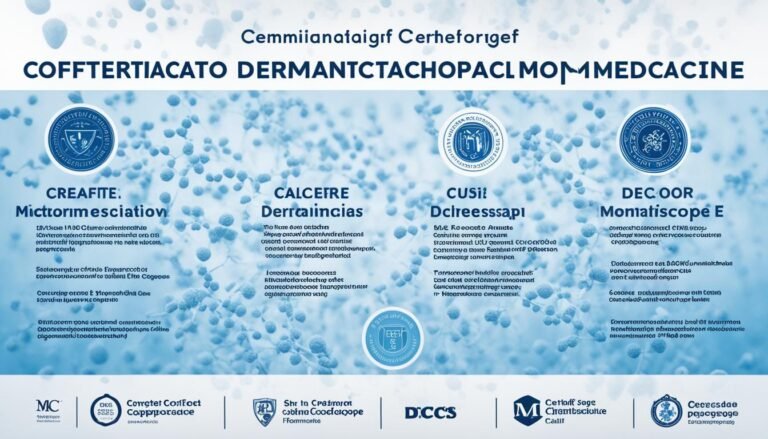A Guide to Master’s Degrees in Healthcare Management
The healthcare industry makes up nearly 18 percent of the U.S. Gross Domestic Product. This leads to a big need for well-educated leaders in healthcare. More and more, having a master’s degree in healthcare management is key to leading medical groups, insurers, and big healthcare companies.
Top roles in healthcare can bring in around $195,630. Jobs in specialized hospitals pay even more. So, getting a master’s in healthcare administration is a smart choice financially.
Earning an MHA degree can lead you to manage in healthcare. But it also offers chances in public health. Government roles pay well, too. This means grads have many job paths to pick from.
This guide is for those interested in healthcare management. It offers info on master’s degrees, top schools, job outlooks, and more. Whether you’re new to the field or looking to grow your career, it’s filled with useful tips.
Key Takeaways:
- Healthcare management is crucial for running medical practices and healthcare firms.
- For top jobs in hospitals or systems, you need at least a master’s in healthcare administration.
- Healthcare leaders make about $118,800 on average, but more in big hospitals.
- With an MHA, you can also work in public health. Government jobs pay as well as private ones.
Why Pursue a Master’s Degree in Healthcare Management?
A Master’s Degree in Healthcare Management sets the stage for career growth in healthcare. It’s essential for those aiming at leadership roles. With a master’s, you get the necessary expertise for managing health organizations and dealing with business aspects. This degree is also your ticket to better pay, with six-figure salaries common.
With a master’s, you can dive deep into specific areas like public health or policy. This special knowledge gives you a competitive advantage when you’re job hunting.
The Benefits of a Healthcare Management Master’s Degree
A Master’s Degree in Healthcare Management is valuable because:
- You get to specialize in managing health facilities.
- It equips you with business skills to understand the healthcare world.
- It’s needed for top positions in healthcare administration.
- You can achieve high earnings.
- There’s a chance to focus on public health, policy, or how organizations develop.
A master’s degree makes you stand out and shows you’re committed to growing professionally in healthcare. It’s a solid base for a career in health administration and prepares you for leadership.
“A master’s degree in healthcare management is a strategic investment in your career. It positions you for success in a rapidly evolving industry and opens doors to a wide range of rewarding opportunities.” – John Smith, Healthcare Administrator
Choosing a master’s degree in healthcare management is choosing to invest in yourself. It boosts your opportunities in the thriving field of healthcare administration.
| Advantages | Career Prospects | Salary Potential |
|---|---|---|
|
|
|
Selecting a Master’s Program in Healthcare Administration
When looking at a master’s program in healthcare administration, several points are vital to think about. It is key to check if the program is linked with a top medical school or healthcare system. This connection offers real-world experience and access to expert faculty.
Looking into online programs is also crucial. They give flexibility for those who work but still want to study. With online courses, students can learn at their own pace, making it easier to manage work and school.
It’s also important to review the course content. Programs should cover areas like the American healthcare system, business, leadership, and public policy. A good program will offer a wide range of courses, giving you the knowledge you need for a successful career in healthcare administration.
Some well-known programs let you choose specializations. These tracks let you focus on areas like healthcare finance or informatics. This way, your education can match your career interests more closely.
Thinking about these factors will help you pick the right master’s program in healthcare administration. It should match your goals and help you grow in the healthcare field.
Factors to Consider When Choosing a Master’s Program in Healthcare Administration:
- Affiliation with a strong medical school or healthcare system
- Availability of online degree programs
- Comprehensive curriculum covering key areas of healthcare administration
- Offering specialization tracks for focused learning
Core Curriculum and Electives in a Healthcare Administration Master’s Degree
A healthcare administration master’s degree helps students learn to run healthcare groups well. It teaches a mix of business and medical topics for a strong career start.
The core classes dive into managing healthcare, finances, leadership, and tech in healthcare. Students get to know the US healthcare system deeply, with its rules and chances.
Studying how business operates in healthcare is a big part, too. This means learning about money management, HR, and how to use technology. These classes help students make sure their healthcare jobs are both caring and financially sound.
Understanding healthcare technology is very important, since tech is everywhere in the industry. Students learn about electronic records, information systems, and meeting regulations in healthcare.
Alongside core studies, students get to pick elective courses. These let them focus on areas they’re interested in within healthcare management. Choices include health policy, public health, planning, and making healthcare better.
The whole program, including both required and chosen courses, rounds out a student’s skills well. It aids them in making smart choices, leading, and improving healthcare companies. With this knowledge, graduates can do a lot in the healthcare field.
Types of Healthcare Management Degrees and Careers
If you’re looking to work in healthcare management, you can choose from different degrees. It depends on your education and goals. You might aim for a bachelor’s or master’s degree.
Undergraduate Healthcare Management Degrees:
Bachelor’s degrees in healthcare management are a good start. They teach basic management and how to communicate well. You’ll also learn business and healthcare basics. This prepares you to work in healthcare administration.
Graduate Healthcare Management Degrees:
Master’s degrees, like an MHA, offer advanced learning. They focus on managing in healthcare and leading teams. You’ll dig into health policy, finance, and planning. After, you can lead in hospitals or other healthcare places.
Careers in Healthcare Administration
With a degree in healthcare management, many jobs are open to you. Here are some roles you could take:
- Hospital Administrator: You’d lead a hospital, making sure it runs well. Your job is to care for patients, handle money, and set rules.
- Clinical Director: This role involves managing clinical services. You look after quality, rules, and how care is given.
- Pharmaceutical Executive: In this job, you’d run a pharmaceutical business. You oversee making and selling drugs.
- Health Services Manager: You’d manage services in places like clinics or nursing homes. Your goal is to make operations run smoothly and keep patients happy.
Expect the need for healthcare managers to grow by 32 percent by 2030. This means there will be more jobs in healthcare administration.
How to Find the Top Healthcare Management Degree Programs
Looking for the best healthcare management degree programs means thinking about a few key things. As you start your search, remember these important points to help you choose the right program.
- Accreditation: Accreditation is very important. It shows that a program meets high standards. Make sure the program has the right kinds of accreditation. Types to look for include regional and program-specific ones, like CAHME or CEPH.
- Resources: Think about what each program offers you. Career help, chances to intern, and making connections in the industry matter a lot. They can help you learn better and find good jobs later on.
- Rankings: Use lists from sources like US News and World Report. They show how well different schools do. They also tell you what kind of education and results to expect from each program.
By looking at these aspects, you’ll find a healthcare management program that matches your career dreams. It will give you the skills and tools you need to succeed.
The top schools in healthcare management are the University of Pennsylvania, Northeastern University, and Ohio State University. They’re known for their great education in healthcare management. Their programs get students ready for work in this exciting field.
It’s important to spend time on choosing the right program. This will lead to a great education and a rewarding career in a fast-growing area.
Careers and Salaries for Individuals with Healthcare Management Degrees
Healthcare management degrees offer many chances in the job market. They lead to roles like hospital administrators and clinical directors. According to the Bureau of Labor Statistics (BLS), healthcare management pros earn a median salary of $88,580 yearly. Salaries can go up if you have a higher degree or move into senior positions. This field’s earning potential is high, attracting many professionals.
Healthcare management jobs remain in high demand. This is because the industry grows and changes. The BLS expects jobs for health service managers to grow 32% from 2020 to 2030. This growth is due to an aging population, new healthcare tech, and the push for better care and efficiency.
Medical and health service managers are key to healthcare, ensuring smooth operations and good management. They bring their know-how in business, health policies, and leadership to the table. This helps in offering excellent care and new solutions.
Healthcare management jobs also come with great pay. The salaries, depending on education, experience, and location, are competitive. The BLS says the top 10% can earn up to $195,630 annually. Besides salary, they can get health coverage, retirement plans, and bonuses too.
Job Roles in Healthcare Administration
Healthcare admin degrees get you ready for many key roles. Some of these include:
- Hospital Administrator: They manage medical facility operations, making sure everything runs smoothly.
- Clinical Director: In charge of clinical services, they work with professionals to enhance patient care.
- Pharmaceutical Executive: Leads in the drug industry, focusing on strategy, sales, and compliance.
- Health Services Manager: They lead healthcare service delivery, from hospitals to nursing homes.
These are just some roles you can take with a healthcare management degree. Whether you’re leading in healthcare systems or running clinical programs, your impact on the industry can be significant.
What is a Master of Health Care Administration Degree?
A Master of Health Care Administration (MHA) is for people wanting to lead in health care. It mixes business and health care topics. This includes health policy, finance, and leadership.
MHA students learn about healthcare from a financial, organizational, and policy view. They study how to manage health systems. They also learn to deal with the health care’s complexity.
This degree usually takes about two years to finish. But, the time can change based on the school’s credit needs. Students get to learn theories and real-life health care problems.
Choosing an MHA means looking at program costs. Tuition can range from $13,395 to over $117,609 for in-person classes. For online options, it’s around $6,500 to $36,000. Pick a program that fits your budget and gives a good education.
With a Master of Health Care Administration, people can find top jobs in health care leadership. They work in hospitals, consulting, and big health organizations. These leaders focus on good patient care and better health system performance.
Residential MHA vs. Executive MHA
When choosing an MHA, students can pick between residential and executive programs. The choice depends on their knowledge and experience.
Residential MHAs work best for those new to health care management. They include a residency where students can learn on the job. This hands-on part helps turn theory into real skills, making them better at health care leadership.
Executive MHAs are for people already working in health care who want to move up. They can be online or in a mix of in-person and online. These classes focus on making leaders stronger and better at running health care teams.
The rules to get into these programs are different. If you’re into a residential MHA, you’ll probably need a bachelor’s in a related area. But for an executive MHA, work experience is key. Make sure to check what each program needs before you apply.
Conclusion
A master’s degree in healthcare management brings many advantages. It helps those aiming to boost their careers in healthcare. The need for skilled healthcare administrators is growing, making this degree more valuable.
This degree provides a wide range of knowledge and skills. These are crucial for leading in healthcare. Graduates learn to handle complex healthcare systems and balance care with financial needs. Plus, they are trained to make smart decisions.
With a healthcare management degree, many job opportunities open up. These jobs often come with good pay. When picking a program, it’s key to look at the accreditation, resources, and rankings. This ensures you get a top-notch education.
Overall, getting a master’s degree in healthcare management is a smart move. It can set you on a path to a rewarding career in healthcare administration. This field is always changing, offering exciting challenges.
FAQ
Q: What are the benefits of pursuing a Master’s Degree in Healthcare Management?
Q: What factors should I consider when selecting a Master’s program in Healthcare Administration?
Q: What courses are typically included in the curriculum of a healthcare administration master’s degree program?
Q: What types of healthcare management degrees and careers are available?
Q: How can I find the top healthcare management degree programs?
Q: What are the career prospects and salaries for individuals with healthcare management degrees?
Q: What is a Master of Health Care Administration degree?
Q: What is the difference between residential MHA and executive MHA programs?
Source Links
- https://www.healthcare-management-degree.net/
- https://www.healthcareadministrationedu.org/healthcare-administration-masters-degrees/
- https://www.coursera.org/articles/master-healthcare-administration

Our Healthcare Editorial Team is composed of subject matter experts and seasoned healthcare consultants who bring decades of combined experience and a wealth of academic qualifications. With advanced degrees and certifications in various medical and healthcare management fields, they are dedicated to supporting the personal and career development of healthcare professionals. Their expertise spans clinical practice, healthcare policy, patient advocacy, and public health, allowing us to offer insightful, well-researched content that enhances professional growth and informs practice.
Disclaimer
The client education section of our blog is intended to support healthcare providers by offering informational resources for patient education. However, this information is not meant to serve as medical advice. We advise healthcare professionals to ensure all content is consistent with their clinical knowledge and confirm with current medical standards before using it in their practice or advising patients. For specific medical issues, always refer to professional guidance and standards of care.
For any legal matters or specific medical concerns, we strongly recommend consulting with a qualified legal professional or referring to government websites for authoritative information.







